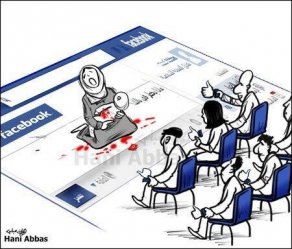Social Media has rightly been celebrated as an empowering tool for ordinary citizens to mobilize against repressive rulers, and make marginalized voices heard. But a crucial question remains unanswered: why should power-hungry states, with de facto control over access to the Internet, impassively concede to defeat?

Experts have called the civil war in Syria the most socially mediated civil conflict in history. Illustration: Hani Abbas
The simple answer is: they do not. Behind the scenes, autocratic governments across the world have been extremely active in developing and refining a whole arsenal of tools to surveil, manipulate and censor the digital flow of information in their own country.
The ongoing civil war in Syria that has claimed hundreds of thousands of lives is a vivid example. Experts have called it the most socially mediated civil conflict in history, with events being painstakingly captured, documented and communicated via the Internet. Thousands of YouTube videos record the images of killed and injured people in morgues, hospitals and market places. Activists use Twitter and Facebook accounts to inform each other about military operations and massacres, and to organize and coordinate.
The Syrian regime has actively expanded its virtual presence, from employing an Electronic Army of hackers to using an array of spying software against its entire population. It even maintains a lively Instagram account with no sign of the ongoing war. To intercept Syrian Facebook users’ information and communication, the regime has reportedly launched attacks that allow a third party to access and modify the user’s content. Cruder forms of interception, such as torturing people to obtain their Facebook passwords, have also been used. On several occasions, the regime has gone all out and shut down the entire Internet.
- Read more at the Monkey Cage, where the complete text was published 24 February 2015.
- The blog post is based on the author’s article in Journal of Peace Research, May 2015: ‘Pulling the plug. ‘Network disruptions and violence in civil conflict‘